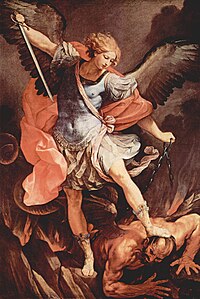Saints (portal)
From: http://en.wikipedia.org/wiki/Portal:Saints
Portal:Saints
From Wikipedia, the free encyclopedia
A saint is a particularly good or holy person. The term is used within Christianity, with definitions varying by denomination, but English-language publications will sometimes use saint to describe a revered person from another religion. The word itself means “holy” and is derived from the Latin sanctus. The concept originates in early Greek Christian literature with the use of the word hagios (Greek άγιος meaning “holy” or "holy one") and in the New Testament, where it is used to describe the followers of Jesus of Nazareth. (In the Old Testament, the cognate is the Hebrew word qodesh, קדש)
Other religions also recognize certain individuals as having particular holiness (or enlightenment.)
Michael is one of the principal angels in Abrahamic tradition; his name was said to have been the war-cry of the angels in the battle fought in heaven against Satan and his followers.[citation needed]
Much of the late Midrashic detail about Michael was transmitted to Christian mythology through the Book of Enoch, whence it was taken up and further elaborated. In late medieval Christianity, Michael, together with St George, became the patron saint of chivalry, and of the first chivalric order of France, the Order of Saint Michael of 1469. In the British honours system, a chivalric order founded in 1818 is also named for these two saints, the Order of St Michael and St George. St Michael is also considered in many Christian circles as the patron saint of the warrior. Police officers and soldiers, particularly paratroopers, regard him as their patron saint.

Canonization (also spelled Canonisation) is the act by which a Christian Church declares a deceased person to be a saint, inscribing that person in the canon, or list, of recognized saints. Originally, individuals were recognized as saints without any formal process, as happened, for instance, in the case of Saint Peter and the Blessed Virgin Mary.
In the Catholic Church (excepting the Eastern Catholic Churches), the act of canonization is now reserved to the Holy See and occurs at the conclusion of a long process requiring extensive proof that the person proposed for canonization lived, and died, in such an exemplary and holy way that he or she is worthy to be recognized as a saint. The Church's official recognition of sanctity implies that the persons are now in heavenly glory, that they may be publicly invoked and mentioned officially in the Liturgy of the Church, most especially in the Litany of the Saints in the Canon of the Mass. Other Christian Churches still follow the older practice (see, for instance, below on Eastern Orthodox practice).
Canonization, whether formal or informal, does not make someone a saint: it is only a declaration that the person is a saint and was a saint even before canonization. It is generally recognized that there are many more saints in heaven than have been canonized on earth.
- ...that Martha, the mother of Simeon Stylites, is said to have only consented to marriage after John the Baptist appeared to her telling her to do so?
"The hutzpah of our love is pleasing to you, O Lord, just as it pleased you that we should steal from your bounty."
- — Ephrem the Syrian, Hymns on Faith 16:5
- Saint symbology
- List of saints
- List of saints by name
- Chronological list of saints and blesseds
- List of royal saints and martyrs
- List of canonizations
- Saints
- Saints by country
- Christianity
- Doctors of the Church
- Eastern Catholic saints
- Eastern Orthodox saints
- Oriental Orthodox saints
- Roman Catholic saints
- Anglican saints
The Saints Wikiproject aims primarily at standardizing the articles about people venerated by some Christians as saints or the blessed and ensuring quality articles.
Non-Christian Saints If there is an interest in including saints from religions other than Christianity, please propose those changes on our talk page and we can integrate them into the wikiproject.
To do
- {{WikiProject Saints}} This should be edited in the discussion page of all project pages to reflect a current assessment.
- The Saints Portal needs some dedicated work.
- Write articles or find redirects for Saints at Wikipedia:WikiProject Saints/Missing articles.
- Write articles or find redirects for Beatifieds in the Catholic Encyclopedia but not in Wikipedia.
- Saints images
- Move images from other language wikis to the Commons.
- Help categorize existing images by nationality.
- Add all articles that fall within the scope of this project to the Wikipedia:WikiProject Saints/Articles list
- Check recent changes for recent improvements, other changes, or vandalism to these articles.
- Check Category:Saints articles needing attention for articles requiring immediate attention.
- Add {{Infobox Saint}} or {{portalpar|Saints|Gloriole.svg}} to all articles in Category:Saints articles needing infoboxes
October 18, 2006 - Pope Benedict XVI canonizes four new saints
| Saints on Wikinews News | Saints on Wikiquote Quotes | Saints on Commons Images | Saints on Wikisource Texts | Saints on Wikibooks Manuals |
- Log in to post comments

